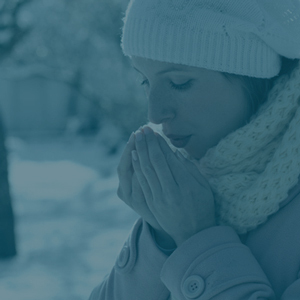
Holiday cheer fills the crisp air and the snow covers the tops of trees, painting a joyful winter picture. However, cold weather often comes with numerous potential health dangers. Young children, older adults, and the chronically ill may be put into vulnerable positions this winter, and Southwest Spine and Pain Center wants everyone to be prepared. The following information outlines the top three winter health dangers and smart ways to defend and avoid them from affecting you and your family.
Hypothermia. Approximately 700 deaths occur each year in the United States from hypothermia. When your body temperature is below 95 degrees Fahrenheit (35 degrees Celsius) it is considered hypothermic. Adults over the age of 65 are often at a higher risk because their bodies tend not to adjust as quickly to temperature changes.
Pay attention to the warning signs this winter. If you feel socially withdrawn, confused, sleep, or have slurred speech, seek medical attention immediately. Hypothermia can cause the heart to slow down and be very dangerous to your health. Layer warm clothes and have good protection for your feet and hands.
Cold and Flu. The average adult gets an average of three colds each year. One in five adults will get the flu. Though the cold and flu isn’t specific to the winter months, it is more frequent when the weather temperature drops. One research study says that the flu virus is able to stay in the air longer when it is cold and dry.
The symptoms of a cold and flu are very similar. What for: dry, scratchy sore throat, sneezing, headache, runny nose, watery eyes, chills, and fever. People often have symptoms of muscle aches and fatigue. Most people will recover within a week. Use over-the-counter medicine if you can. There is no cure for the cold, so these medicines will help fight off the virus. Talk with your doctor about what is safe for you to take.
Heart Attacks. High cholesterol, smoking cigarettes, and being male are the most common risk factors of heart attacks. The cold weather and winter holidays are risks for heart attacks as well. When the weather is cold, blood pressure increases causing more strain on the heart to maintain a warm body temperature.
Watch for chest pain, shortness of breather, fatigue, sweating, nausea, irregular heartbeat, and blue tint to skin. Whenever you go outside, bundle up and don’t get involved in any strenuous activities.
Our main goal at Southwest Spine and Pain Center is for everyone to be able to live safe and pain-free lives. The holidays are often a time we push aside health concerns in order to be with family or get winter chores done. Don’t ignore the warning signs and see a doctor if there are any changes to your health!
If chronic pain is impacting your life, don't wait to schedule an appointment at Southwest Spine and Pain Center. With four locations and same day appointments, the pain management specialists at Southwest Spine and Pain Center are dedicated to helping those who suffer from chronic pain live the life they want to! To schedule an appointment, visit our locations tab!
The advice and information contained in this article is for educational purposes only, and is not intended to replace or counter a physician’s advice or judgment. Please always consult your physician before taking any advice learned here or in any other educational medical material.
©Southwest Spine and Pain Center, 2013
©Medical Marketing Solutions, 2013
